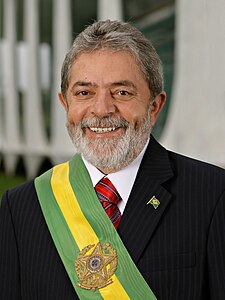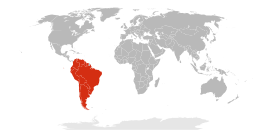Brazil's Luiz Inácio Lula da Silva governs way better than Venezuela's Hugo Chávez
Tuesday, July 08, 2008

That's the gist of an article in the New York Times yesterday with the title Quietly, Brazil Eclipses an Ally. Being from North America and living in Asia, South America has never been high on the list of things to pay attention to, but I am definitely not a fan of melodramatic politicians - those that like to hear themselves talk and always complain about potential conspiracies. There's something about the ratcheting up of the rhetoric in politicians like Mugabe and Chávez that shows that they still don't have the slightest inkling of what it means to properly govern a country. Note that this ratcheting up of the rhetoric only shows incompetence, not necessarily whether a person is evil or not, so I'm not trying to make a comparison between Mugabe and Chávez on that scale.
Now to the article: I love Lula da Silva's style of governing. The article is two pages long and goes into some detail about how he continues to heap praise upon Chávez while at the same time outclassing him at every turn. For example:
Mr. da Silva has diversified Brazil’s already strong industrial base and created an ample political coalition with almost a dozen neighbors. Huge recent oil discoveries in Brazilian waters have allowed him to blunt Venezuela’s efforts to use its oil largess to win influence. Venezuela’s economy has shown signs of stumbling, while its dependence on trade with Brazil has intensified...“The pragmatic side of Lula, the union leader who was always a negotiator, has paid off,” said Kenneth Maxwell, a historian at Harvard University and a columnist for the Brazilian newspaper Folha de São Paulo.“While Chávez grabs the headlines, the debate over whether Brazil is becoming a regional power is moot,” he said. “Brazil has actually made it to that level, but in a very nonbombastic way.”
This oil field is the Tupi Field, in the southeast. The article in Portuguese has much more than the one in English:
O Campo petrolífero de Tupi está localizado na bacia de Santos, a 250 quilometros da costa, na projeção cartográfica do estado do Rio de Janeiro. O campo foi oficialmente divulgado por sua operadora, a Petrobras, em 8 de novembro de 2007. Suas reservas são estimadas entre 5 e 8 bilhões de barris de petróleo do tipo alta qualidade, ou seja petróleo leve, além de gás natural.The Tupi oil field is located in the base of Santos, 250 km from the coast, in a cartographic projection in the state of Rio de Janeiro. The field was officially discovered by its operator, Petrobas, on the 8th of November 2007. Its reserves are estimated to be between 5 and 8 billions of barrels of high quality petroleum, or light oil, plus natural gas.
As reservas anunciadas representam mais do dobro das reservas de Roncador, que contém aproximadamente 3 bilhões de barris recuperáveis de petróleo pesado, de menor valor comercial e era, até então, a maior descoberta de petróleo brasileira segundo disse o consultor Caio Carvalhão, do Cambridge Energy Research Association, no Rio de Janeiro. A Petrobras é a operadora do campo, no qual tem 65% de participação, sendo que a britânica BG Group detém 25%, e a portuguesa Petrogal/Galp, 10%.The announced reserves represent more that twice that of the Roncador reserves, which contain approximately 3 billion barrels of recoverable heavy oil, with less commercial value, and was until then the largest discovery of Brazilian oil according to the consultant Caio Carvalhão, of the Cambridge Energy Research Association in Rio de Janeiro. Petrobas is the operator of the field, which has a 65% stake, the British BG Group has 25%, and the Portuguese Petrogal/Galp has 10%.
Back to the NYT article:
While high oil prices have bolstered the theatricality of Mr. Chávez’s maverick policies, Venezuela’s most pervasive influence remains limited to a handful of the region’s poorest nations — Bolivia, Cuba, Dominica and Nicaragua — members of ALBA, a trade alliance championed by Mr. Chávez. Another Chávez ally, Ecuador, is not a member. Meanwhile, Mr. da Silva’s unexpected embrace of the market-friendly ideas begun by his predecessor, Fernando Henrique Cardoso, has emphasized how heterogeneous political thinking has become in Latin America, even on the left.Here's an image of all the ALBA nations:

Then:
Venezuela’s attempts to assemble an alliance of countries remains limited to its ALBA trade bloc. But Brazil hosted leaders of 12 South American nations in May to create Unasur, a continental bloc modeled on the European Union that unites the region’s two main trading groups, Mercosur and the Andean Community.Here's Unasur:

Unasur has four official languages (note that French isn't included there because French Guiana is part of the European Union:
União de Nações Sul-Americanas
Unión de Naciones Suramericanas (espanhol)
Unie van Zuid-Amerikaanse Naties (neerlandês)
Union of South American Nations (inglês)
The Bank of the South remains little more than a grandiose idea. Last December, just nine days after Mr. Chávez announced the formation of the bank, which Brazil is expected to join, Mr. da Silva attended a low-key event in Uruguay to inaugurate a new branch of Brazil’s development bank, B.N.D.E.S.
The Bank of the South would be hard-pressed to catch up to B.N.D.E.S., which financed $4.2 billion worth of investments worldwide last year, including loans for the expansion of the Caracas metro.
Lastly:
Despite all of Brazil’s accomplishments in surging ahead of Venezuela in Latin America, Mr. da Silva has eschewed being labeled a leader in the region. “We are not trying to find a leader in Latin America,” he said in the September interview. “We don’t need a leader. I am not worried about being the leader of anything. What I want is to govern my country well.”It's always good when there are nearby concrete examples of how a soft tongue and much diplomacy ends up making one's country much stronger than the alternative (too much rhetoric and ideology). "Ordem e Progresso".







0 comments:
Post a Comment